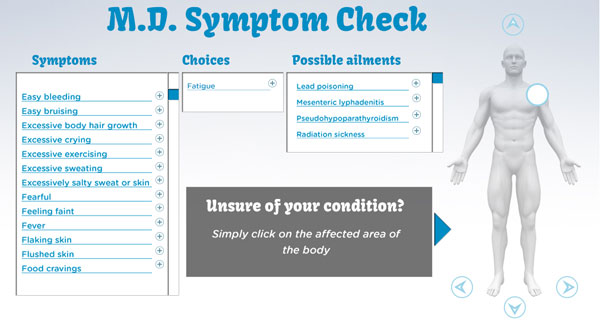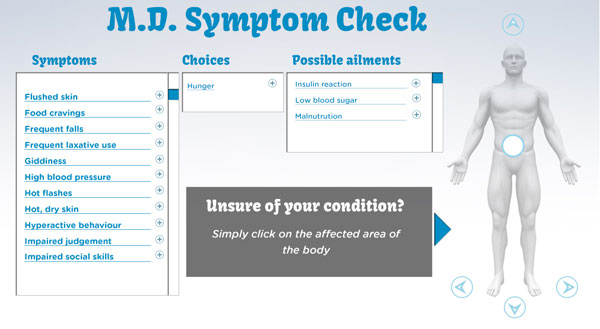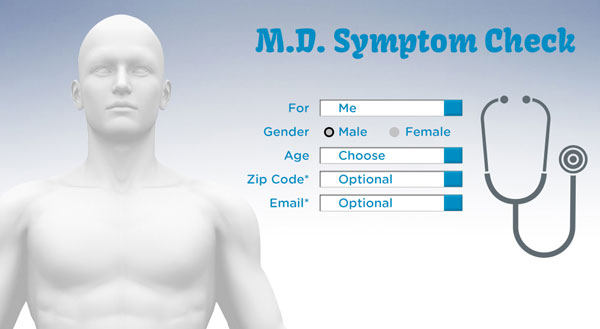How Health Experts Feel About Your Self Diagnosis

Cyberchondria. The online Oxford Dictionary defines this as “A person who compulsively searches the Internet for information about particular real or imagined symptoms of illness”.
This is not to say that occasionally checking the Internet for initial information on symptoms which you may or may not be presenting makes you a cyberchondriac. However, many health experts agree that placing too much stock in the search results can cause as much or more harm than good. Doctors and wellness experts report both positive and negative effects from patients self-diagnosing, but it’s safer to take advantage of your medical aid to see a professional.
On the positive side, Internet research can help a patient to get more specific on the symptom in question, learning valuable and accurate information. On the negative side, bloggers and lay people in general who run online medical sites are not typically held accountable for misinformation or errors in the way that professionals are. One of the most cited concerns of medical professionals regarding self-diagnosis is that many patients, lacking medical training, run symptom searches without proper context.
A stabbing pain in your head could be indicative of a brain tumour and you may well receive that diagnosis online but without the accompanying symptoms of vision problems, hearing problems, seizures and more, it’s highly unlikely and your trip to the doctor would probably just cost you a lot of money when all you really needed was some paracetamol. Hippo spoke with several medical practitioners and institutions to find out what they thought.

Courtesy of
ER24 spokesperson, Russel Meiring
In this day and age of limited time with doctors, coupled with ample opportunity to Google anything, the temptation for people to reach their own medical conclusion is strong. When you self-diagnose, you are assuming that you know the subtleties that diagnosis constitutes. This can be very dangerous. People who assume they can surmise what is going on with themselves may miss the fine distinction of diagnosis. One would also have to consider who put that information up on the internet in the first place. Is it a reputable specialist or a blogger reading a medical journal? I would not recommend they practice self-diagnosis at all.
The information posted may be from a member of public who had similar experiences and giving a home remedy, to an organisation that is selling its product. Rather get a number of opinions from credible sources, or ask your GP where you would be able to get these opinions. If these are unavailable, the last resort should be the internet. Rather use web addresses that end in .org or .edu when looking for health care information.
Physiological conditions as well as your “smaller” diseases are quite commonly looked up on the Internet. Diagnosis, whether medical of physiological, should be left to the professionals at all times. If one does search what is the most “commonly erroneously self-diagnosed conditions”, Aspergers, Gluten Intolerance, Lyme Disease and Bipolar Disorder are the most common results.

Courtesy of
Catherine Day Dietetics owner, Catherine Day
Visits to the doctor's office can at times be nothing but a false alarm which can result in unnecessary medical expenses. Therefore, it is important that we equip ourselves with accurate medical and nutrition based knowledge in order to avoid unfounded worry and stress.
One of the most common symptoms which people often seek medical care for is fatigue. Fatigue is a non-specific symptom which can be caused by medical conditions, lifestyle related factors and behaviours or even dietary practices. When experiencing fatigue, an individual may self-diagnose themselves with iron deficiency anaemia as fatigue is a well-known symptom of iron deficiency.
These other symptoms include:
- Poor muscle function
- Leg pain or discomfort
- Growth abnormalities in children
- Poor concentration
- Epithelial disorders
- Reduced immunity
- Finger nails which are thin and flat with cuplike depressions (spoon-shaped nails)
- Pale skin
- Lower inner eyelids are pale
- Glossitis (waxy glistening appearance of the tongue)
Individuals who are at a higher risk for iron deficiency anaemia include:
- Infants and young children
- Adolescent girls (especially pregnant adolescent girls)
- Pregnant women
- People following carbohydrate rich diets which lack protein sources
- People following vegetarian diets which are incomplete in terms of protein intake
- Vegans
- Female athletes (especially endurance athletes)
- Elderly
If you fall within the following “at risk populations” and exhibit the above signs and symptoms it is imperative that you seek medical attention as only laboratory tests can confirm a diagnosis of iron deficiency anaemia.
Courtesy of
Health24.com resident GP Dr Owen Wiese
Any physical symptom can be a cause of concern for a patient. Even a simple fever may be interpreted as possible meningitis or even a case of blood septicaemia.
Fast access to health information is incredibly beneficial in modern medicine and has revolutionised the way doctors treat patients. This, however, becomes problematic when patients interpret symptoms based on information found online. Most medical writers, when discussing a symptom, will cover all the possible causes – including the rare, often unlikely causes. The following is a list of the most common symptoms that make people worry.
- Fever
Feeling feverish or spiking a high fever simply shows that your body is reacting to an infection or inflammatory process. I’ve had patients who, armed with printouts, worry that they may be suffering from malignant hyperthermia – a rare condition where patients have very high temperatures, usually caused by anaesthesia drugs. A fever is not dangerous itself, but shows that the body is fighting something. Finding the cause is crucial. - Yellow sputum when coughing
Patients are often worried that they might have pneumonia when they notice the colour of their sputum turning yellow. A change in sputum colour when coughing does not always indicate pneumonia. A simple post nasal drip or upper respiratory infection can also change sputum colour. When severe fevers, chills and shortness of breath are present, it could be pneumonia. Yellow sputum on its own, does not indicate lung infection. - Abdominal pain
One of the most common presenting complaints in general practice is abdominal pain, which can be caused by anything ranging from simple constipation due to dietary factors to more serious conditions like a ruptured, infected appendix or bowel obstruction. - Sore or stiff neck
Many patients are very concerned that they may have meningitis when they experience a sore or stiff neck. Meningitis has a range of other signs and symptoms that may indicate an infection of the meninges. A bad posture, unsuitable pillow or even a sport injury may cause muscle spasms, leading to a sore and stiff neck. - Headaches
Headaches are also a very common complaint that can cause great distress in patients. The causes of headache vary, with high blood pressure, musculoskeletal problems, tension and even poor eyesight being some of the more common causes. Persistent headaches always warrant investigation, but a headache now and again does not necessarily indicate a more sinister cause like a brain tumour.

Courtesy of
Clinical Psychologist, Michele Carelse for Feel Good Health
Over the years I have had many people referred to me by doctors who have seen patients in emergency rooms with suspected heart attacks - shortness of breath, chest tightness, pain and dizziness. After an extensive medical workout, 'nothing' is found and the diagnosis of panic attack is made. Panic attacks can be as a result of stress or anxiety and are relatively easy to deal with, especially if they are identified early.
If left untreated, they can become entrenched and patients often become dependent on psychiatric medication, with many negative effects on social and occupational functioning. In my professional experience, anxiety and panic attacks can be successfully treated with a combination of natural remedies and management techniques.
- Dizziness/Vertigo/Fainting
These symptoms could be indicative of a range of neurological problems - but stop to consider whether you have been eating regularly as low blood sugar levels could be the culprit. You could also pop into your pharmacy and have your blood pressure checked - low blood pressure could also cause these symptoms. - ADD/ADHD
Besides a diagnosis of ADHD, the list of problems that could contribute to the constellation of hyperactivity, concentration and behavioural problems is very long and parents should make sure that a proper assessment is done. Psychiatric drugs should be the last resort due to their high risk of side effects. Many cases respond well to parent and teacher counselling, natural remedies and work done with the child and family if this turns out to be the problem.
Courtesy of
Aliya Holland of Nature’s Choice
Stomach pain and indigestion can be extremely painful, especially when accompanied by either loose or stiff bowel movements. Finding an accurate diagnosis for something this vague can be very tricky online.
These kinds of complaints can often ruin one’s ability to get on with simple day to day activities. Lactose intolerance can often present with these symptoms and once influenza, stomach viruses and other factors have been excluded, it’s definitely something to consider. Whilst not being able to digest lactose is not in itself a life threatening illness, over time the damage to your gut and overall health can be considerable.
Look out for these classic symptoms:
- Diarrhoea lasting more than five days
- Unintended weight loss
- Black tarry stools
- Unexplained fatigue
- Pain in the stomach area that improves or worsens when you eat
- Pain when having a bowel movement
A very easy and economical way to tell if lactose is causing digestive health issues is to simply remove all products that contain lactose from your diet for one to two weeks to see if your symptoms vanish. If they do, there’s a high possibility that you are lactose intolerant. If this seems to be the case – no need to fret as these days there is a whole range of dairy alternatives to suit your taste buds and preferences, from almond to quinoa, rice to coconut and of course soya, there is something for everyone!
Closing Thought
Above all, remember that no one is suggesting that you do not see a medical professional should you experience pain or discomfort, it’s the other way around. Ensure that you have a good medical aid policy in place and see a professional at your earliest convenience, just don’t let those online diagnoses keep you up at night.
Hippo Blog Categories





































